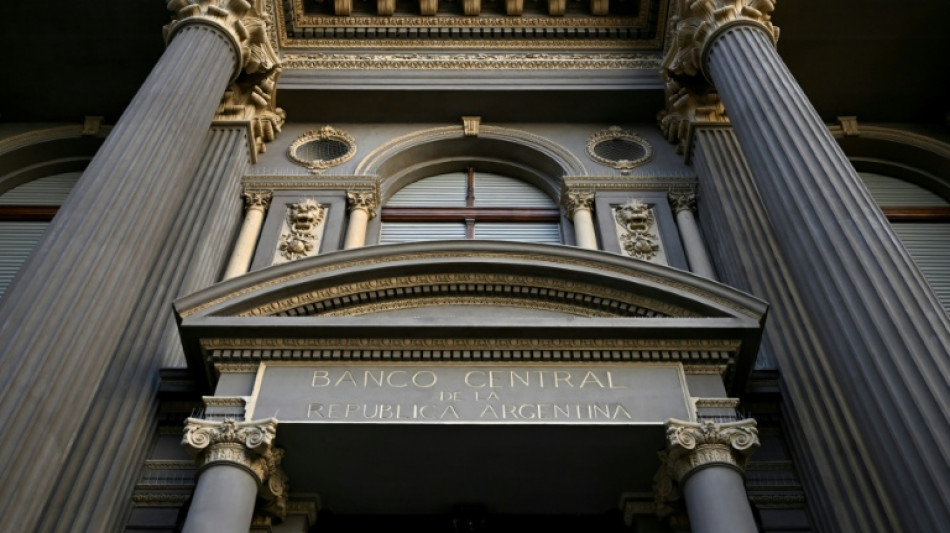
-
 Partey signs for Villarreal while on bail for rape charges
Partey signs for Villarreal while on bail for rape charges
-
Wales have the talent to rise again, says rugby head coach Tandy

-
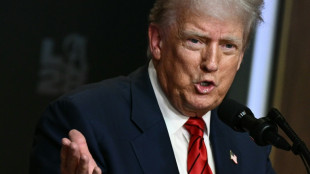 US partners seek relief as Trump tariffs upend global trade
US partners seek relief as Trump tariffs upend global trade
-
Five England players nominated for women's Ballon d'Or

-
 PSG dominate list of men's Ballon D'Or nominees
PSG dominate list of men's Ballon D'Or nominees
-
Americans eating (slightly) less ultra-processed food

-
 Man Utd agree 85m euro deal to sign Sesko: reports
Man Utd agree 85m euro deal to sign Sesko: reports
-
France to rule on controversial bee-killing pesticide bill
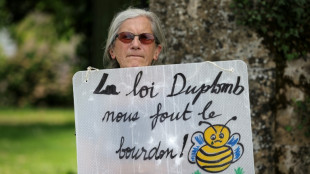
-
 Germany factory output falls to lowest since pandemic in 2020
Germany factory output falls to lowest since pandemic in 2020
-
Swiss to seek more talks with US as 'horror' tariffs kick in

-
 Barcelona strip Ter Stegen of captain's armband
Barcelona strip Ter Stegen of captain's armband
-
Trump demands new US census as redistricting war spreads

-
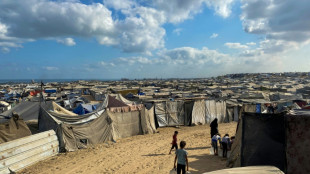 'How much worse could it get?' Gazans fear full occupation
'How much worse could it get?' Gazans fear full occupation
-
France seeks to 'stabilise' wildfire raging in south

-
 Ski world champion Venier quits, saying hunger has gone
Ski world champion Venier quits, saying hunger has gone
-
Israel security cabinet to discuss Gaza war plans
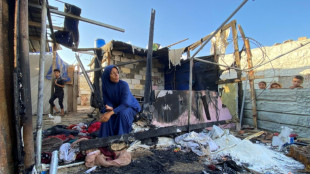
-
 Deadly Indian Himalayan flood likely caused by glacier collapse, experts say
Deadly Indian Himalayan flood likely caused by glacier collapse, experts say
-
UK pensioner, student arrested for backing Palestine Action

-
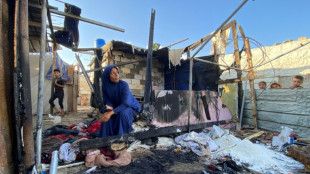 Israeli security cabinet to discuss future Gaza war plans
Israeli security cabinet to discuss future Gaza war plans
-
Antonio to leave West Ham after car crash

-
 Kremlin says Trump-Putin meeting agreed for 'coming days'
Kremlin says Trump-Putin meeting agreed for 'coming days'
-
Bank of England cuts rate as keeps watch over tariffs
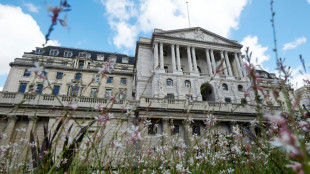
-
 Maddison set to miss most of Spurs season after knee injury
Maddison set to miss most of Spurs season after knee injury
-
Plastic pollution treaty talks stuck in 'dialogue of the deaf'
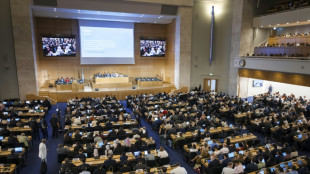
-
 Stock markets brush aside higher US tariffs
Stock markets brush aside higher US tariffs
-
Siemens warns US tariffs causing investment caution

-
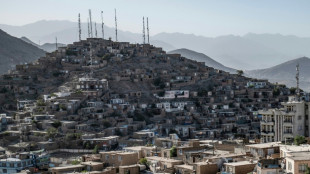 Influx of Afghan returnees fuels Kabul housing crisis
Influx of Afghan returnees fuels Kabul housing crisis
-
Israeli security cabinet to hold talks over future Gaza war plans
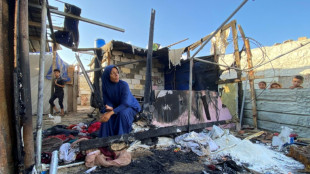
-
 Macron urges tougher line in standoff with Algeria
Macron urges tougher line in standoff with Algeria
-
UK says first migrants held under return deal with France

-
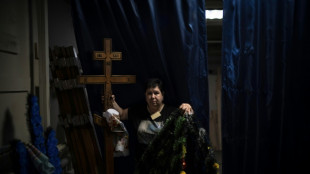 Ukraine's funeral workers bearing the burden of war
Ukraine's funeral workers bearing the burden of war
-
India exporters say 50% Trump levy a 'severe setback'
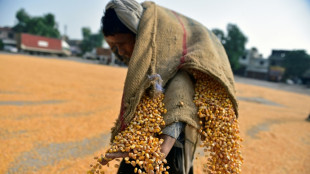
-
 Germany factory output lowest since pandemic in 2020
Germany factory output lowest since pandemic in 2020
-
Thailand and Cambodia agree to extend peace pact
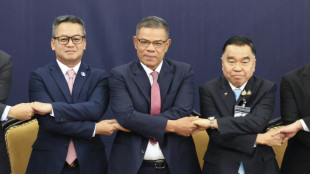
-
 Third-hottest July on record wreaks climate havoc
Third-hottest July on record wreaks climate havoc
-
Trump-Putin meeting agreed for 'coming days', venue set: Kremlin

-
 Frankfurt sign Japan winger Doan until 2030
Frankfurt sign Japan winger Doan until 2030
-
Swiss reel from 'horror scenario' after US tariff blow

-
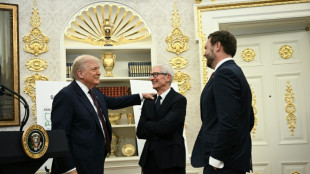 Apple to hike investment in US to $600 bn over four years
Apple to hike investment in US to $600 bn over four years
-
Asian markets rise as traders look past Trump chip threat

-
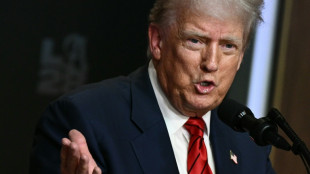 Higher US tariffs kick in for dozens of trading partners
Higher US tariffs kick in for dozens of trading partners
-
Deliveroo slips back into loss on DoorDash takeover costs
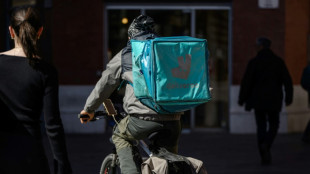
-
 'Dog ate my passport': All Black rookie in Argentina trip pickle
'Dog ate my passport': All Black rookie in Argentina trip pickle
-
US tariffs prompt Toyota profit warning
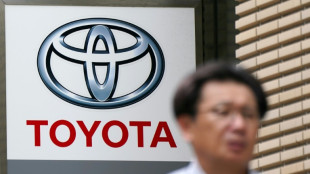
-
 Eddie Palmieri, Latin music trailblazer, dies at 88
Eddie Palmieri, Latin music trailblazer, dies at 88
-
Japan's World Cosplay Summit to escape summer heat in 2027

-
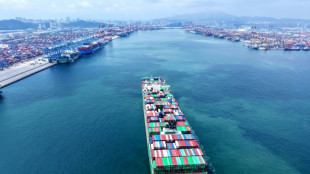 China exports top forecasts as EU, ASEAN shipments offset US drop
China exports top forecasts as EU, ASEAN shipments offset US drop
-
Cockatoos can bust a move: Australian research
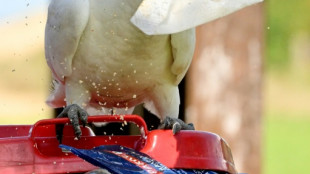
-
 Arrest warrant sought for South Korea's ex-first lady Kim
Arrest warrant sought for South Korea's ex-first lady Kim
-
Khachanov topples Zverev to book ATP Toronto title clash with Shelton

| SCU | 0% | 12.72 | $ | |
| CMSC | -0.04% | 22.94 | $ | |
| RELX | 1.02% | 49.315 | $ | |
| NGG | -0.26% | 72.115 | $ | |
| RBGPF | 1.42% | 76 | $ | |
| CMSD | -0.21% | 23.49 | $ | |
| VOD | -0.76% | 11.215 | $ | |
| GSK | 2.39% | 37.65 | $ | |
| SCS | 0.78% | 16.115 | $ | |
| RYCEF | 0.14% | 14.5 | $ | |
| BCC | 0.53% | 83.359 | $ | |
| BTI | 0.16% | 56.49 | $ | |
| AZN | 0.77% | 74.17 | $ | |
| JRI | 0.37% | 13.39 | $ | |
| BP | 0.75% | 34.135 | $ | |
| BCE | 1.42% | 23.585 | $ | |
| RIO | 1.09% | 60.75 | $ |

Distrusting Argentines loath to bank their 'mattress dollars'
Argentine "Rita Lopez," 84, keeps her US dollars hidden in an empty pea can in the kitchen. Since childhood, she has steered clear of banks in a country that has veered from one economic crisis to another.
"I wouldn't even think of putting my savings in the bank," the former lawyer told AFP at her modest apartment in Buenos Aires. She asked to use a fake name to shield herself from thieves.
Lopez is not alone. The government estimates there are about $200 billion so-called "mattress dollars" out there -- five times the reserves of the Central Bank.
On Thursday, President Javier Milei's government launched a plan to encourage Argentines to bank these dollars, also commonly stashed under floor boards, in safety deposit boxes or offshore accounts.
Under the initiative, anyone can make a deposit of up to 100 million pesos (about $90,000) without having to declare the provenance.
The goal is to boost foreign reserves, stimulate the formal economy and bolster the peso.
But Lopez remains skeptical.
"The one who kept his savings (in the bank) was my father, he always lost, it always went bad for him," she said.
One of the worst moments, said Lopez, was in 2001 when the then-government put in place so-called "corralito" (corraling) measures to limit cash withdrawals and freeze bank accounts.
That move, intended to limit capital flight in the midst of a prolonged recession, was widely considered draconian and the spark for protests that left 39 people dead and toppled a president.
- Trafficking, corruption, smuggling? -
Argentina has faced 16 economic crises since 1860. Lopez has lived through seven of them in the last 50 years.
Countless people lost life savings as the system collapsed over and over, inflation spiraled out of control, and governments imposed currency controls.
Their fingers burnt, many Argentines took to trading their battered pesos for whatever greenbacks they could lay their hands on, and hoarding them at home. In cash.
Now Milei wants that money to enter the system, saying in an interview Monday: "I don't care in the slightest where the dollars come from." His is not the first Argentine government to try this.
As long as the dollars are not in the system, explained economist Julian Zicari of the University of Buenos Aires, they "do not contribute to (foreign) reserves nor generate lending capacity for banks."
Self-declared anarcho-capitalist Milei has imposed strict budget-cutting measures on the South American country since taking office in December 2023, resulting in inflation dropping from 211 percent to 118 percent last year.
Maintaining a stable exchange rate is one of his chief goals.
Last year, a tax amnesty brought in billions of dollars in deposits and, in April, Argentina received a first tranche of $12 billion from a new $20 billion dollar loan agreed by the International Monetary Fund (IMF).
Some fear the "mattress dollar" concessions will abet money laundering, though the government has denied this.
"By not requiring justification of origin... the possibility is enabled for funds from drug trafficking, human trafficking, public corruption or smuggling to be incorporated into the formal system," economist Pablo Tigani wrote in the Ambito newspaper.
In effect, he argued, it amounts to "an amnesty for those who did not pay taxes, without any distinction between tax evasion, illicit enrichment, or even money laundering."
Presidential spokesman Manuel Adorni insisted Thursday that those with undeclared funds "are not criminals, they are the vast majority of Argentines who have been abused by excessive taxes and controls."
Either way, Lopez insists nothing can get her to part with her pea can.
"One day the government tells you one thing and then another government comes in and does something else. I don't trust them. I wouldn't put my money in the bank," she said.
I.Matar--SF-PST
